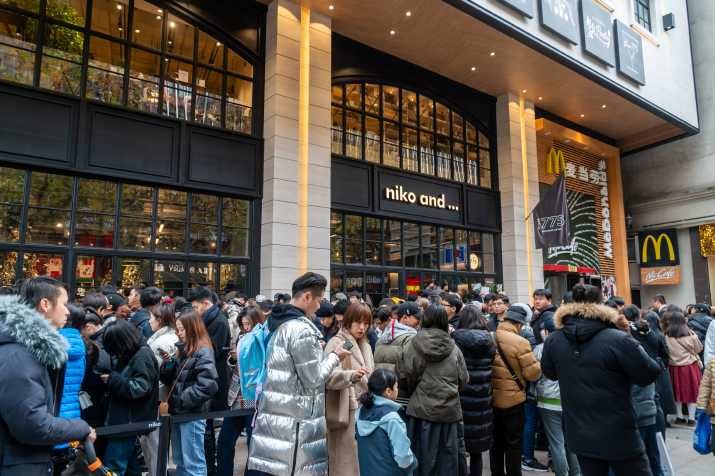| Business |
| On the First Track | |
| Debut-store economy becomes a new engine of growth and consumption | |
|
|
 The crowd in front of the niko and … global flagship store in Shanghai on December 22, 2019 (XINHUA)
On December 12, 2019 when the Bund Finance Center opened in Shanghai's premier waterfront area, the plan to revitalize the economy received an immediate shot as Gènevant, the bespoke bejeweled shoe brand from the UK, opened its first global store there, followed by more deluxe brands. In the newly renovated New World City Plaza on Nanjing Road, an all-in-one entertainment complex in Shanghai, French coffee and chocolate brand Voisin arrived, opening its first store in Asia, according to the Shanghai-based Wenhui Daily. More than buying Consulting firm Nielsen defines first stores in a report on China's first-store economy in April 2019 as the first store of a reputed or trendy brand in a certain region, or a renovated store of a long-standing brand through innovation of business model. In Shanghai, 756 first stores were set up during the first three quarters of 2019, soaring 74.6 percent over the figure a year ago, according to Shanghai Municipal Commission of Commerce data. At the end of November 2019, the city had more than 900 first stores. One of the latest brands to open its global flagship store in Shanghai was niko and …, the fashion and lifestyle store from Japan, attracting long queues of consumers on the December 21, 2019 launch of its sprawling 3,500-square-meter three-story store, selling clothes, catering and household items. It is also the brand's first store on the Chinese mainland. First stores not only sell products, more importantly, they aim at spreading a brand new lifestyle, which means consumers are focusing on a more diversified lifestyle than merely buying things, Nielsen's research director in China Zhao Ting said. "First stores focus more on the consumption model that is interesting, high-quality and diversified, which will further enrich the lifestyle of local consumers," she told 21st Century Business Herald. Consumers' early adoption of first stores will also boost upgrading of consumption, both increasing sales in the first stores and bringing new contents to consume, said Jiang Nan, commercial department director of real estate services firm CBRE Group in west China. In Chengdu, capital city of Sichuan Province in southwest China, for instance, Hey Tea, a tea drink brand, set up its first store in 2018, also the first in the region. It boosted tea drink stores' development with its drinks costing 20-30 yuan ($2.89-4.33) on average, the 21st Century Business Herald report said.  A Lego flagship store in Beijing on March 1, 2019 (XINHUA)
Wooing brands In a report on China's first stores in the first quarter of 2019, big data provider AskCI Corp. said Chinese cities are divided into three echelons on the basis of their capability to attract first stores. Shanghai is in the first echelon because of its advantages in population, market size and high-quality commercial estate. It is followed by Hong Kong, Beijing and Taipei in the second echelon, while Chengdu, Guangzhou, Shenzhen, Hangzhou and Nanjing are in the third. According to the report, the first-store economy means a city uses its regional advantages to attract brands from home and abroad to set up their first regional stores so as to integrate the brand value and the city's local resources. China's first-store economy is still in the primary stage, according to Zhao. Most of the first stores are located only in a few developed cities instead of spreading all over the country because consumers in those cities have a strong will to pursue innovation, fashion and trends and have strong consumption power. With its advantage as a world leading shopping center, Shanghai attracts far more first stores than other Chinese cities, she added. Shenzhen, a window for China's reform and opening up, has also achieved success in introducing first stores; Chengdu attracts the most first stores in west China by well learning from Shanghai's experience. Jiang said the development of the first-store economy indicates the business vitality of a city. Shanghai is the first city in China to raise the concept of the first-store economy. In June 2018, it issued nine measures to attract more first stores, especially global flagship stores, like strengthening trademark protection and issuing specific standards for the global launch of new products. It is also the first city in China that includes first stores in its statistical reports. According to the latest report, in 2018 Shanghai attracted 835 first stores, including 300 first stores of international brands. Beijing and Chengdu then followed Shanghai and started to pay more attention to first stores. In March 2019, the Beijing Municipal Bureau of Commerce issued the Measures to Encourage the Development of First Stores, which includes measures such as financially supporting global and domestic brands that open their first store in the capital. Not to be outdone, Chengdu came up with two plans in 2018 with the target of attracting 230 new first stores in 2019, including 100 global first stores and international brands. The number of first stores in 2020 was set at 15 percent higher than that and in 2021, 20 percent higher than the goal in 2020. The AskCI report forecasts that competition among Chinese cities in attracting first stores will become increasingly fierce. According to its figures, in 2018 more than 40 international brands set up their first China store in Chengdu, Nanjing, Hangzhou, Guangzhou and Shenzhen, accounting for 20 percent of the first stores of international brands on the Chinese mainland, which is close to the number in Beijing. "The potentials of cities in the third echelon must never be underestimated," the report emphasized. Copyedited by Sudeshna Sarkar Comments to wangjun@bjreview.com |
|
||||||||||||||||||||||||||||||
|